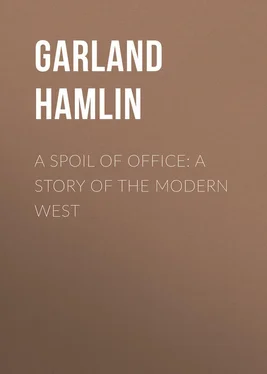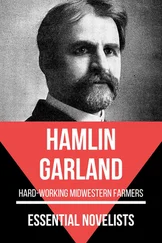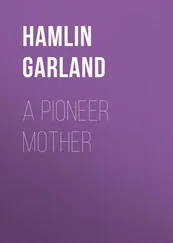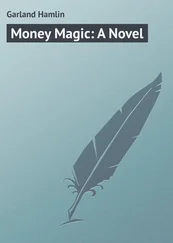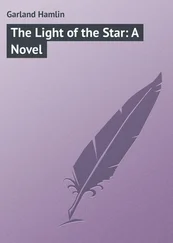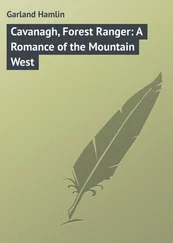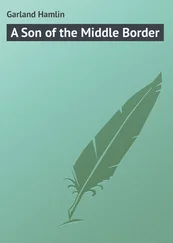Hamlin Garland - A Spoil of Office - A Story of the Modern West
Здесь есть возможность читать онлайн «Hamlin Garland - A Spoil of Office - A Story of the Modern West» — ознакомительный отрывок электронной книги совершенно бесплатно, а после прочтения отрывка купить полную версию. В некоторых случаях можно слушать аудио, скачать через торрент в формате fb2 и присутствует краткое содержание. Жанр: foreign_antique, foreign_prose, на английском языке. Описание произведения, (предисловие) а так же отзывы посетителей доступны на портале библиотеки ЛибКат.
- Название:A Spoil of Office: A Story of the Modern West
- Автор:
- Жанр:
- Год:неизвестен
- ISBN:нет данных
- Рейтинг книги:5 / 5. Голосов: 1
-
Избранное:Добавить в избранное
- Отзывы:
-
Ваша оценка:
- 100
- 1
- 2
- 3
- 4
- 5
A Spoil of Office: A Story of the Modern West: краткое содержание, описание и аннотация
Предлагаем к чтению аннотацию, описание, краткое содержание или предисловие (зависит от того, что написал сам автор книги «A Spoil of Office: A Story of the Modern West»). Если вы не нашли необходимую информацию о книге — напишите в комментариях, мы постараемся отыскать её.
A Spoil of Office: A Story of the Modern West — читать онлайн ознакомительный отрывок
Ниже представлен текст книги, разбитый по страницам. Система сохранения места последней прочитанной страницы, позволяет с удобством читать онлайн бесплатно книгу «A Spoil of Office: A Story of the Modern West», без необходимости каждый раз заново искать на чём Вы остановились. Поставьте закладку, и сможете в любой момент перейти на страницу, на которой закончили чтение.
Интервал:
Закладка:
Bradley felt again the fascination of an orator, and again his heart glowed with a secret feeling that he, too, could be an orator like that. He felt strong, and cool, and hopeful, while Radbourn was speaking, but afterward that horrible, weakening fear came back upon him.
He couldn't look at poor Harry Stillman, who came on a few names further. Harry had pounded away all the week on Webster's reply to Hayne, and he now stood forth in piteous contrast to his ponderous theme. His thin, shaking legs toed-in like an Indian's, and his trousers were tight, and short, and checked, which seemed to increase the tightness and shortness. He had narrow shoulders and thin, long arms, which he used like a jumping jack, each gesture being curiously unrelated to his facial expression, which was mainly appealing and apprehensive. As Shep Watson said, "He looked as if he expected a barn to fall on him."
At last Bradley's name was spoken, and he rose in a mist. The windows had disappeared. They were mere blurs of light. As he walked up the aisle the floor fell away from the soles of his feet. He no longer walked, he was a brain floating in space. He made his way to the stage without accident, for he had rehearsed it all so many times in his mind that unconscious cerebration attended to the necessary motions. When he faced the assembly, he seemed facing a boundless sea of faces. They in their turn were awed by something they saw in his eyes. His face was white and his eyes burned with a singular light. A mysterious power emanated from him as from the born orator.
Like all the rest he had taken a theme that was far beyond his apparent powers, and the apparent comprehension of his audience; but they had been fed so long upon William Tell, Rienzi, Marc Antony and Spartacus, that every line was familiar. Nothing was too ponderous, too lofty, too peak-addressing for them.
He mispronounced the words, his gestures were awkward and spasmodic, but lofty emotion exalted him and vibrated in his voice. He thrilled every heart. He had opened somewhere, somehow, a vast reservoir of power. A great calm fell upon him. A wild joy of new-found strength that awed and thrilled his own heart. It seemed as if a new spirit had taken his flesh. As he went on he grew more dignified and graceful. His great arms seemed to be gigantic, as he thundered against the Carthaginians. Everybody forgot his dress, his freckled face, and when he closed, the applause was instant and generous.
As he walked back to his seat, the exultant light went out of his eyes, his limbs relaxed, the windows and the sunlight cleared to vulgar day, and his face flushed with timidity. He sat down with a feeling of melancholy in his heart, as if something divine had faded out of his life.
But Radbourn reached out his hand in the face of the whole school and said, "First rate!" The pupils had the western love for oratory, and several of them crowded about to congratulate him on his speech.
Bradley did not feel at all sure of his success. He had been something alien to himself in that speech, and he could not remember what he had said or done. He was not at all sure that he had done the right thing or the best thing. He was suspicious of his power because he no longer felt it. He was like a man who had dreamed of flying and woke to find himself paralyzed. After his triumph he was the same great, awkward, country hired-man.
"Say, look here, Talcott," said Radbourn, as they met at the door of the chapel going out, "I'm going to propose you as a member of the Delta; come up Monday, and I'll put you through."
"Oh, they don't want me."
"Don't be so modest. They're in need of just such men. You'll be in demand now, no fear about that."
There was a struggle now to get him into the societies, which were, as usual, bitter rivals. He was secretly anxious to be one of the debaters. In fact he had counted more on that than upon all the rest of the advantages of the school. He thought it would please Her better.
He joined the Delta, over which Radbourn presided, and wore the society pin with genuine pride. He sat for several meetings silently in his seat, awed by the excessive formality of proceedings, and the strictness of the parliamentary rules. It was a curious thing to see the meeting come to order out of a chaos of wrestling, shouting, singing members whose excess of life filled the room like a crowd of prize-fighters.
Rap! Rap! And the sound of the gavel stilled the noise as if each man had received a blow on his head.
They took their seats while the stern president remained standing. One final rap, and the room was perfectly quiet, and every member an inexorable parliamentarian, ready to question decisions, or rise to points of order at the slightest infraction of Cushing's manual. Radbourn ruled with a gavel of iron, but they all enjoyed it the more. Half the fun and probably half the benefit of the society would have been lost with the loss of order.
This strenuous dignity awed Bradley for a time. His fellows seemed transformed into something quite other than their usual selves, into grave law-makers. This strangeness wore away after a time and he grew more at ease. He began to study Cushing along with the rest. It laid the foundation for a thorough knowledge of the methods of conducting a meeting, which was afterward of so much value to him.
His first attempt at debating was upon the question, "Should farmers be free traders?" a question which was introduced by Milton, who was always attempting to introduce questions which would strike fire. Nothing pleased his fun-loving nature more than to take part in a "live debate."
As real free traders were scarce, Mason, a brilliant young Democrat, requested Radbourn to take the side of free trade, and he consented. Milton formed the third part of the free trade cohort. He liked the fun of trying to debate on the opposite side, a thing which would have been impossible to Bradley's more intense and simple-hearted nature. What he believed he fought for.
Mason led off with a discussion of the theory of free exchange and made a passionate plea, florid and declamatory, which gave Fergusson, a cool, pointed, scholarly Norwegian, an excellent chance to raise a laugh. He called the attention of the house to the "copperhead Democracy," which the gentleman of the opposition was preaching. He asked what the practical application would mean. Plainly it meant cheap goods.
"That's what we want," interrupted Mason, and was silenced savagely by the chairman.
"England would flood us with cheap goods."
"Let 'em flood," said somebody unknown, and the chairman was helpless.
Fergusson worked away steadily and was called down at last.
He was distinguished as one of the few men who always talked out his ten minutes.
Radbourn astonished them all by saying with absolute sincerity: "Free trade as a theory is right. Considered as a question of ethics, as a question of the trend of things, it's right. The right to trade is as much my right, as my right to produce. The one question is whether it ought to be put into operation at once. There is no reason why the farmer should uphold protection."
From this on his remarks had a mysterious quality. "I'm a free trader, but I'm not a Democrat. Tariff tinkering is not free trade, and I don't believe the Democrats would do any more than the Republicans, but that aint the question. The question is whether the farmers should be free traders."
After the discussion along familiar lines had taken place, Radbourn resumed the chair and called on any one in the room to volunteer a word on either side. "We would like to hear from Talcott," he said.
"Talcott, Talcott," called the rest.
Bradley rose, as if impelled by some irresistible power within himself. He began stammeringly. He had but one line of thought at his command, and that was the line of thought indicated by Miss Wilbur in her speech at the picnic, the Home Market idea, upon which he had spent a great deal of thought. "Mr. Chairman, I don't believe in free trade. I believe if we had free trade it would make us all farmers for England. It aint what we ought t' do. We've got gold in our hills, an' coal an' timber to manufacture. What we want t' do is to build up our industries; make a home market."
Читать дальшеИнтервал:
Закладка:
Похожие книги на «A Spoil of Office: A Story of the Modern West»
Представляем Вашему вниманию похожие книги на «A Spoil of Office: A Story of the Modern West» списком для выбора. Мы отобрали схожую по названию и смыслу литературу в надежде предоставить читателям больше вариантов отыскать новые, интересные, ещё непрочитанные произведения.
Обсуждение, отзывы о книге «A Spoil of Office: A Story of the Modern West» и просто собственные мнения читателей. Оставьте ваши комментарии, напишите, что Вы думаете о произведении, его смысле или главных героях. Укажите что конкретно понравилось, а что нет, и почему Вы так считаете.
